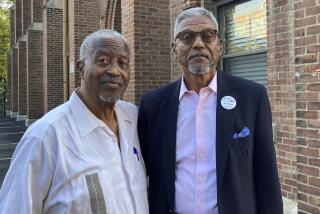Long Crippled by Financial, Social Woes, East St. Louis Is Now Fearing the Worst
- Share via
EAST ST. LOUIS, Ill. — Lake Villa Griffin lies beside a gentle wood, behind the housing project for which it is named. The chirping of birds and crickets wafted across the placid waters the other day. A squirrel scampered over a dead tree jutting out over the water.
Not many residents of public housing have their own lakes. But Villa Griffin tenants do not consider themselves lucky.
Their “lake” is a stagnant pond of raw sewage that covers two acres of land where children used to play.
The stinking cesspool, estimated at one time to have covered five acres, has stood there since December, when an ancient sewer beneath the development collapsed.
Fears of Epidemic
The sewers have been collapsing all over East St. Louis, flooding schools, flowing into roads and sparking fears of an epidemic.
“It’s like a Third World country,” said Sister Julia Huiskamp, a nun who runs a Catholic Urban Charities program at the housing development.
She was talking about Villa Griffin, but, more and more, that is how people are describing this beleaguered city.
East St. Louis, located just across the Mississippi River from the shimmering St. Louis, Mo., skyline, has long been beset by crippling financial and social problems. But residents now say the problems are reaching critical mass.
There is growing concern over whether the city, under the current Administration, can provide even the most basic of services. Last week, Gov. James R. Thompson said that the state will not help bail the city out as long as Mayor Carl E. Officer remains in power.
East St. Louis, with only $5 million a year in revenues, is more than $35 million in debt. The city of 57,000 people cannot afford to pick up the garbage regularly or pay its employees on time. Its understaffed and underequipped Police Department must rely on assistance from the state police to patrol the streets and on donations from out-of-town businesses for such necessities as police radios.
Finances Probed
In addition, St. Clair County State’s Atty. John Baricevic last month launched a grand jury investigation of the city’s finances, centering on allegations that the city has diverted employee pension funds to its strapped general fund and that someone has forged the signature of the city treasurer on documents.
The city’s assets have been frozen several times in the last year by creditors, including the federal government, which alleged city officials had mishandled Environmental Protection Agency funds. Similar allegations have been made by the Illinois Department of Transportation.
“It’s getting pretty desperate,” Thompson told the St. Louis Post-Dispatch last week. “There have to be some fundamental changes. The present Administration has demonstrated it is absolutely incapable of running this city.”
The flamboyant 36-year-old mayor has been unavailable for comment. But his flip response to previous criticism from Thompson has been: “The hell with him--I didn’t ask him for any (money) in the first place.”
Officer, a Democrat who has been mayor for 10 years, does not come up for reelection until 1991. But in last month’s election of the eight-member Board of Aldermen, only three of the candidates he endorsed won, while some of his harshest critics, including a convicted felon, won seats.
Officer last week accused the Republican governor of channeling “enormous sums of money” into the city to defeat his slate, a charge the governor has denied.
In a speech at a high school, Officer criticized Thompson and Baricevic and renewed an earlier charge that unnamed elected officials and private developers are involved in a racist “conspiracy” to wrest control of the city away from its black elected officials.
Baricevic has denounced Officer previously for mismanagement and what he called Officer’s excessive travel and extravagant security measures, including Uzi-toting bodyguards.
Records Destroyed in Fire
He sued Officer last year, charging that the mayor had improperly received $80,000 in public funds. The charges were dropped, however, after officials contended that city financial records had been destroyed in a fire.
Meanwhile, the city’s problems worsen.
The school board is faced with a $12-million deficit. Someone fired a gunshot into the home of the superintendent after he proposed laying off half of the district’s 1,200 employees. And the schools were closed for several days because of flooding caused by backed-up sewers.
Joseph T. Kurre, director of an East Side Health District clinic, said he is fearful that the sewage problems throughout the city could cause outbreaks of serious diseases, such as diphtheria, tetanus and cholera.
Until the city began work on the sewer problem recently, sewage often would bubble up in kitchen sinks in the sprawling Villa Griffin development.
“Sometimes it happens two or three times a day,” said Katherine Ashford, a Villa Griffin resident. When it happened, her children would carry the filthy brown liquid out of the house in buckets to dispose of it.
Deadline on Repairs
The city recently began working on draining the lake and repairing the sewers, using U.S. Community Development Block Grant funds, after Baricevic and legal aid attorneys went to court to force a rapid solution. Associate Circuit Judge Sheila O’Brien ordered that the problem be solved by June 1.
“It’s just the basic kind of things that any other city would do immediately,” said Sister Huiskamp. “You have to have massive intervention and massive media attention to get the basic things.”
East St. Louis’ financial situation has been bad since the 1950s, when industry first started moving out. White flight accelerated the decline. Now the city, which has a nearly all-black population, an estimated 60% of which is on welfare, is pinning its hopes for rejuvenation on an ambitious $473-million waterfront housing and park development. Critics believe it will never be built.
A state task force created by the governor to study the city’s problems said in its report in December that East St. Louis was in “a state of fiscal emergency” and questioned the city’s ability to provide “the basic municipal services required to ensure public safety and the welfare of its citizenry.”
“There is a sense of frustration here,” said David Fields, a spokesman for the governor. “There also is a political realization in the Legislature that unless East St. Louis cleans up its own act, the state is not going to help East St. Louis make the long-term efforts that are needed. . . . The Legislature has shown no great willingness to take up the problem as long as the Administration isn’t willing to cooperate.”
More to Read
Sign up for Essential California
The most important California stories and recommendations in your inbox every morning.
You may occasionally receive promotional content from the Los Angeles Times.













